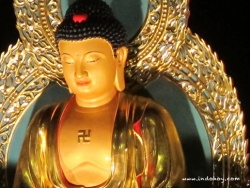Stages and Fruition of the Parami
The parami are then inclinations and potentials that we develop into clear intentions. Their development comes in three stages, the initiating, the gathering and the completion. Initially, one brings the subject to mind. Even this much is useful; it means that parami get built-in as a frame of reference, when other values such as fun, convenience, style, worldly performance and success can be taking over the mind.
The "gathering" stage is when you apply the perfection in the face of opposition. Something in you does not want to bother, other people do not see the point, it is not convenient, etc, etc and etc. The third stage of completion, is when you know your fullness in that perfection will bring you through any obstacles, you can give up your life for it. You realise: "Why not? Life is going to end anyway, why not establish a mind in a position of strength while there is time?"
So, when we establish our minds on one of these parami, we can put aside inclinations as to who is right and who deserves what and we can focus on the intention of our own minds. As we get clear in the respect of such, we then have to meet the resistance that results from going against the current of the flood.
This is the gathering stage, in which there is often an emotional and energetic turbulence in the mind in which doubt and imbalance come to the fore. Here is where one has to use resolve, patience, wisdom, kindness or the examples of wise friends in order to get steady. This is the stage in which perfections get established to supplant impatience, intolerance and other defilements that cramp our potential.
As we look for the balance within the shifts of our mind and the world, we keep checking out the current in accord with the Buddha's own line of enquiry: "Does this behaviour cause me and/or others long term harm, suffering, indignity or stress? Does it lead to my welfare, the welfare of others and peace?"
As a result of that work, our inclination and intentions get established on the good and the whole and we are able to review the fractured, the stained or the afflicted ones. You could say that on touching into the truth, your mind is able to return to healing.
This is how Bodhisattva arises i.e. it is a mind that is in touch with the truth but not fully absorbed in it, gone beyond your previous standpoint, capacity or view and opened to a place of wisdom and compassion. Instead of referring your actions to some self-image of "what I deserve" and "should I really?" and "this is what I always do and all that I am capable of", there is a shift to a response that refers to a wider parameter than that of the habitual self.
The great intention arises: for my welfare, for the welfare of others and leading to peace. Then that twisted loop in the circuitry of intelligence, the loop of self-view, gets untangled. The mind unfolds a deep crease and in that unfolding, nothing is lost except a propensity of unnecessary suffering. It is not the case that "I am perfect" but that a perfect balance has been struck.
This is the third stage of the parami, the completion. It is a change of life.


